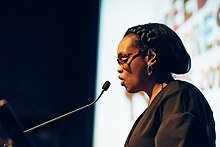
Nimco Ali
I’m proud to say I’m the granddaughter of a freedom fighter – a man who defended his country against Somalian dictatorship. I grew up with a passionate understanding of the rule of law. I was the victim of female genital mutilation (FGM) and this background has given me valuable context for my fight.
The fact is that there are 200 million people with experiences similar to mine. Some happen to be incredible writers and mentors such as Nawal El Saadawi who wrote about her experiences of FGM in The Hidden Face of Eve (1977). This book showed me that FGM was not to do with my race or my faith: it was about my gender. There are similar cultural narratives in the UK around domestic abuse. It was this realisation which helped me find my voice.
That book changed me. Being able to have the space to educate myself meant I could understand FGM as part of a broader conversation around FGM: it then became about taking the whole topic out of a cultural cul-de-sac.
What advice would I give to a young campaigner? I’d say you can talk to anyone, regardless of political affiliation. Sadly, because of our first-past-the-post system we have two political parties, and you should always be open to talking to both. I’d also say you have to make an emotional appeal built around hope and not around sadness.
I’ve found that it’s not just women who are able to hear such an appeal. My message appeals to anybody who has had a traumatic childhood experience – that, in turn, has allowed me to avoid being tribal. That’s a legacy also of my understanding of the civil war in Somalia, where tribalism was the problem. I try to find commonality with those in power.
My legal education – I studied law at Bristol – has helped me too. But I think a young campaigner should educate themselves as broadly as possible. The humanity subjects are very important too: history, drama and literature are the foundation of where things came from and where they’re going. These things can make you a better activist.
Of the 200 million women affected globally by FGM, most are on the African continent. Another 70 million are at risk between now and 2030. My message to people is that we can save those girls, but to do so we need to invest in women. That means focusing on their education and their employment opportunities; we need to create economic independence in them.
We’ve sometimes lapsed into an aid mentality which makes Africa unable to go through the Industrial Revolution. Africa mustn’t be seen as a poverty-hit continent but as a strategic partner which can elevate itself. That’s never been the attitude of the US and the UK. This has created a gap and enabled China and Russia to rob Africa of its natural resources.
As things stand, girls are being raped and murdered instead of being given the power to make choices for their communities. People often don’t see the climate change link here. Of all the places where FGM is rife, 40 per cent is hit by drought or some other global warming impact. Furthermore, if you want to save the elephant or the other big five animals, you have to slow down the population growth in Africa.
China’s wealth is built on the manufacture of things its gets from Africa. You won’t hear an African leader ever asking for aid: what they’re asking for is to change the relationship. Really, they’re asking to be a capitalist country and to work for a living and not receive handouts. The trouble is that aid makes people dependent, and that only two per cent of aid actually gets to grass roots women.
In addition to that, our foreign aid giving arm is too scared of being seen as wasting money which means they can sometimes give in a too restricted manner. Likewise, Save the Children and Oxfam have both been in positions where they hold the power in African countries, and they end up abusing that power, and stymie the people they’re meant to be helping.
So there’s a lot that needs to change. But most of all we need to not define women by their trauma. The first step is to find a new way to talk about the problem – and perhaps that alone would change more than we think.